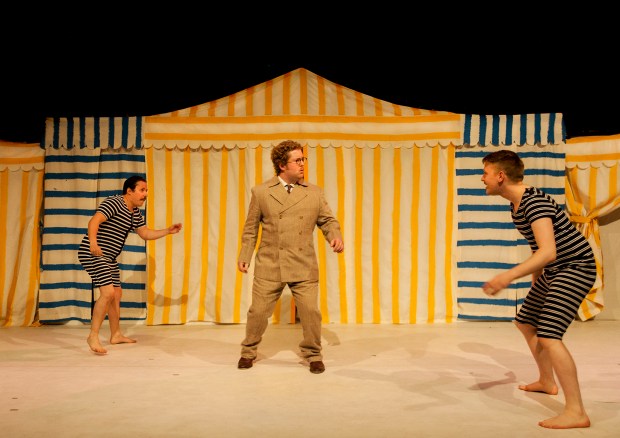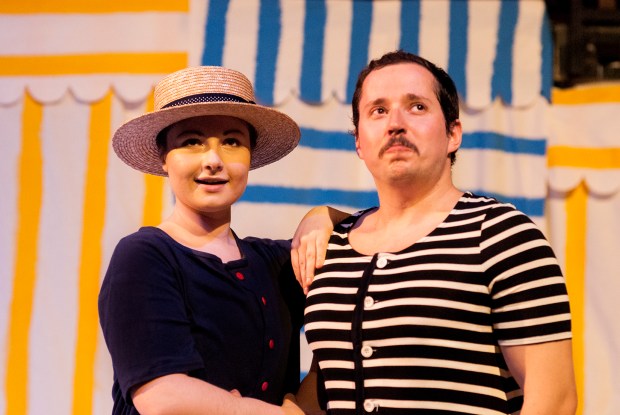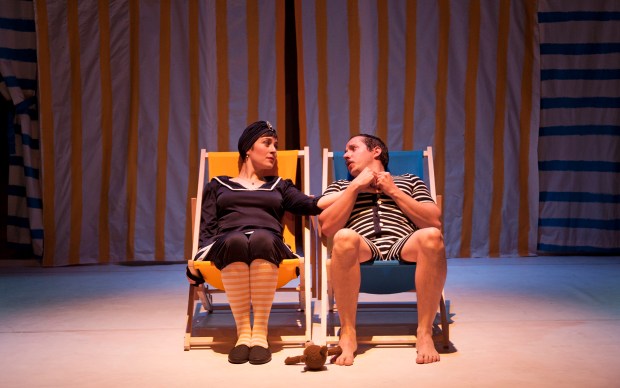★★★★
(Hampstead Garden Opera at Jackson’s Lane Theatre, 21 May 2019)
It’s summer on the Bay of Naples and Partenope rules the roost. With her eager band of male followers and her chic Victorian swimwear, this queen of the sands is the last word in organised fun. But something’s up down at the beach. A rival gang, led by the flattering Emilio, is trying take over the next cove along; and Partenope’s newest beau, Arsace, looks set to steal her heart. If only an irritating little fellow called Eurimene would stop popping up to spoil it all! Hampstead Garden Opera relocate Handel’s comedy of manners to the end of the 19th century, when men were men (and had moustaches and stripy beachwear) and women ruled the waves. Brightly coloured, lively and full of fun, it was the most engaging version of the opera I’ve seen yet; better still, we had the good fortune to see an extremely promising cast of young singers.
Partenope has not been blessed with accessible productions. I’m quite fond of the Sonia Prina version, which is staged in full-on Baroque mode complete with plumes, panniers and even a series of intermezzi; but I can appreciate that this won’t appeal to everyone. I’ve also watched the Andreas Scholl version, which felt tedious, overly serious and visually dull, and which I have little desire to revisit. So, I’ll be completely frank, I went into this Partenope with some qualms. Fortunately, they were banished pretty much immediately. The jaunty set, with backcloths of blue and yellow-striped tent fabric, and the male singers gamely making the best of their unflattering striped swimsuits, cheered me up immensely. The production sets out by making it very clear that Arsace (the new suitor for Partenope’s hand) has shrugged off his previous girlfriend Rosmira to free himself up for bigger fish. It’s also made clear that Rosmira, in the fine tradition of Jilted Baroque Girlfriends™, isn’t just going to sit back and take it. Instead, she disguises herself as a man (the above-mentioned Eurimene) and heads down to the beach to cause havoc.

Newcomer Arsace (Hamish McLaren) finds himself caught between Armindo (Erik Kallo) and Emilio (Peter Martin) on the beach. Photo: Laurent Compagnon
The main gist of the plot is that everyone’s in love with Partenope; everyone, that is, except her Jeeves-like MC Ormonte, who helps arrange the games and makes sure none of the suitors gets ideas above his station. Sweet and shy Armindo has loved Partenope from afar for some time, but daren’t put his devotion into words, and has just been shot down by the arrival of new favourite Arsace. Sung here by the Canadian countertenor Erik Kallo (who also sings as a tenor), Armindo is the Baroque equivalent of the underdog in an American teen movie, who starts out firmly in the friendzone but (spoiler) eventually gets the girl. Kallo spent most of the time with an expression somewhere between forlorn and hangdog, and I can’t deny a little inward cheer when Partenope finally saw Armindo’s merits. Vocally he was supple, expressive and very stable – the last might sound like damning with faint praise, but isn’t. I’ve seen enough student countertenors now, including some in HGO’s previous productions, to know that it’s rare to have such command over the lower countertenor range at this early stage.
And the great thing about the performance was that I had not one but two bright new countertenor hopes to enjoy. The role of Arsace, primo uomo and, quite frankly, bit of a cad and a bounder, was sung by the Welsh countertenor Hamish McLaren in another profoundly impressive performance. His voice was very melodic and, once again, strong in those usually elusive lower regions; blessed with several arias in contrast to the handful allotted poor Armindo, he was able to show off his abilities to a much greater extent and I admired his comfortable grasp of coloratura. I think you might well be seeing a lot of Hamish McLaren in the future. My one difficulty was with his characterisation of Arsace as a lovable, slightly bemused fellow who really only wanted the best for everyone. But then, I suppose this is actually a fault of the libretto. Arsace is the ‘hero’, but he’s very unheroic to modern eyes: he’s left his girlfriend and gone off in pursuit of another woman, to whom he makes protestations of love; then, when his girlfriend turns up in disguise, he experiences deep resurgences of admiration for her. Arsace is the man who wants to have his cake and eat it, and I’m not sure how far my sympathies go with him. There was a bit of a clash for me between McLaren’s acting of Arsace, as an endearingly clueless chap (which I liked) and the actual character as given to us in the opera libretto (which I don’t think I do like).
The focal point of all this swirling testosterone is Partenope herself, sung delightfully by Kali Hardwick with the air of a good-natured silent-movie-era femme fatale, always ready with a twinkle for her army of followers (Hardwick is American, which somehow didn’t surprise me: she had a kind of Stateside sophistication in her very being). This sea queen has a stunning wardrobe, proving that women definitely got the best deal in vintage swimsuits, and that turbans are the way to go on the beach. More important, however, was her voice; and Hardwick has a beautiful clear, flexible soprano, easily able to tackle Partenope’s music and adding a touch of brightness to proceedings. Through her acting, she made Partenope sympathetic, in a way that the two filmed productions never quite manage: we’re seeing the HGO Partenope in light-hearted holiday mode. She’s there to relax, flirt and have fun; and Hardwick suggests, with a few well-placed glances, that she knows exactly what poor tongue-tied Armindo is feeling, and would be willing to indulge him if only the man would speak up.
The programme described Rosmira (the Jilted Baroque Girlfriend™) as the opera’s anti-heroine, and that surprised me, because she’s actually one of the most amusing and relatable characters (here at least). Having been thrown over by Arsace, she comes after her with the avowed intention of making his life a misery, which she achieves magnificently by pretending to be a man and throwing shade at him relentlessly – not to mention encouraging Armindo to speak up to Partenope. Rachael Cox was a perfect little bundle of energy, keen to enjoy the hotheadedness and japes that being a ‘man’ allows her – all at Arsace’s expense. While she gives him short shift, it’s clear that she still has some residual feelings left for him, and Cox and McLaren played off one another well, as they struggled to conceal their complex emotions in front of the other characters. If she was sparkling dramatically, she was equally enjoyable vocally, treading that difficult line between poignancy and comedy that can work so well when done right.

Rosmira, in disguise as Eurimene (Rachael Cox) encourages Armindo (Erik Kallo) Photo: Laurent Compagnon
This being a Baroque opera, neither of the two lower male voices had as much airtime, but Peter Martin’s Emilio offered a swaggering, self-confident contrast to Arsace and Armindo in his ruthless pursuit of Partenope’s affections. His tenor was light, melodic and well-modulated, but due to his limited music, he came into his own primarily through his dramatic abilities – playing off against the indignant suitors; engaging in a fearsome beach battle (in which he’s defeated, followed by a rerun as it should have been in his imagination); and charmingly revealing a penchant for needlework in the final act. The Thai baritone Saran Suebsantiwongse took on the role of Ormonte, who watches over everything with a stern eye and gives Partenope a rare chance to relax and enjoy herself with someone she trusts, without worrying about leading them on. He had great stage presence, with a powerful, colourful voice and, like his colleagues, a marked ability for comic acting. All in all, a fine young cast – watch out for all their names.
Perhaps the only uncertainties in the evening came from the orchestra, who weren’t always as tight and controlled as they could have been, and in which an oboe (or clarinet) went noticeably rogue at one point. But this didn’t detract from a wonderful production full of gumption, which made the opera accessible, bright and fun. And, best of all, it was sung in the original Italian – handled well by the cast. A perfect summer treat.






Great fun to read your review. The pictures of the staging are the icing on the cake. Wouldn’t it be nice to have such a Partenope production available on dvd? Thanks for putting a big smile on my face!
Enjoyed this very much- and miss your posts (in dire need of more book recommendations/reviews)
Hoping you are well!
Don’t worry Bettina – I’ll be back in action soon. Just been writing a book for work but almost done and looking forward to reading again! 😊